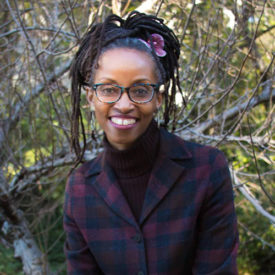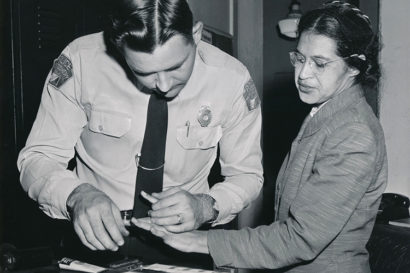The Montgomery bus boycott and the women who made it possible
Berkeley professor Ula Taylor discusses how the 1955-56 bus boycott in Montgomery, Alabama, was led by a group of black women activists working behind the scenes — the Women's Political Council
February 11, 2020
“People know about Rosa Parks. People know about Martin Luther King Jr. — and they should. And they know that it was the Montgomery bus boycott that ignited a certain kind of Southern civil rights movement,” says Ula Taylor, a professor in the Department of African American Studies at UC Berkeley. But, what they might not know, she says, is that it was actually the behind-the-scenes organizing effort by the Women’s Political Council, led by Jo Ann Robinson, that made the boycott successful.
“Even though these women were not in the limelight, they were engaging in a form of leadership,” says Taylor. “But because we live in a country in a culture where we oftentimes identify leadership as a talking head, we don’t understand all of the thinking that goes behind a lot of the ideas that the talking head is even articulating.”
(A podcast episode featuring this interview with Taylor was originally published on Berkeley News in 2018. This is a new version that has been rewritten and remixed.)

The bus boycott in Montgomery, Alabama, which started in December 1955 and lasted more than a year, was a protest campaign against the policy of racial segregation on the public transit system. During the boycott, volunteer drivers gave rides to would-be bus passengers. (Photo taken in 1956 by Dan Weiner; copyright John Broderick)
Read a transcript of Fiat Vox episode #64: “The Montgomery bus boycott and the women who made it possible”:
Ula Taylor: People know about Rosa Parks. People know about Martin Luther King Jr. — and they should. And they know that it was the Montgomery bus boycott that ignited a certain kind of Southern civil rights movement.
[Music: “Stucco Grey” by Blue Dot Sessions]
Narration: Ula Taylor is a professor in the Department of African American Studies at UC Berkeley, where she’s been on the faculty since 1992. In one of her classes, she teaches students about the 1955 citywide bus boycott in Montgomery, Alabama.
Ula Taylor: I have them read this book written by Jo Ann Robinson, who was one of the main organizers of the Montgomery bus boycott, and I introduce them to a group of women called the Women’s Political Council.

As the president of the Women’s Political Council, Jo Ann Robinson was a leader in organizing the 1955-56 Montgomery bus boycott. (Fair use photo via Wikimedia Commons)
Narration: In Robinson’s 1987 memoir, The Montgomery Bus Boycott and the Women who Started It, Robinson writes about how it was actually a group of women — the Women’s Political Council, of which she was president — that made possible the 382-day bus boycott that changed the course of the civil rights movement in the United States.
This is Fiat Vox, a Berkeley News podcast. I’m Anne Brice.
[Music fades]
Narration: The bus boycott was officially called on Dec. 5, 1955, four days after Rosa Parks refused to give up her seat to a white passenger. Martin Luther King Jr. emerged as the public-facing leader of the boycott.
[Audio excerpt from the film “King: A Filmed Record,” aired on Democracy Now! in 2013: Martin Luther King Jr: “That was the day when we started a bus protest, which literally electrified the nation. And that was the day when we decided that we were not going to take segregated buses any longer.”]
Narration: But the main reason the boycott was successful, says Taylor, was because of the organizing effort by the Women’s Political Council.
Ula Taylor: They kept a critique of all of the horrific ways that Black people were forced to ride the bus. They wrote letters to the bus company. They wrote letters to the mayor, basically saying that there needed to be a more humane way of riding the bus.
We’re talking about at least 200-plus Black women in the Women’s Political Council in Montgomery, Alabama. And these were “professional” Black women. Many of them worked at the historically Black colleges. Many of them were local teachers. Many of them had been formally educated at historically Black colleges.
Yes, Martin Luther King Jr. was an amazing, charismatic leader for all of us, but it was because of the Women’s Political Council that provided an anchor and grounding for him to even come into prominence.
[Music: “Copley Beat” by Blue Dot Sessions]

During the boycott, many buses on the road had few passengers. (Photo taken in 1956 by Dan Weiner; copyright John Broderick)
Narration: Taylor says that in almost every political movement in history, there have been women in the background, doing the work that has positioned them outside of the limelight. And that there were different reasons for this throughout time.
Ula Taylor: So, for example, during the 1960s, we have a certain kind of call for a Black nationalist representation of manhood and womanhood. It was during this time period that a lot of these organizations are reacting to the Moynihan Report that said slavery emasculated Black men and created a “mannish woman.”
Narration: The 1965 Moynihan Report, officially called “The Negro Family: The Case for National Action,” was a controversial report written by Assistant Secretary of Labor Daniel Patrick Moynihan and his staff as a way to persuade White House officials that civil rights legislation alone would not produce racial equality.
It concluded that the “deterioration of the fabric of Negro society is the deterioration of the Negro family” and argued that the matriarchal structure of Black culture weakened the ability of Black men to function as authority figures.

Ula Taylor is a professor in the Department of African American Studies. She teaches her students that the Montgomery bus boycott was successful, in large part, because of the organizing effort by the Women’s Political Council. (UC Berkeley photo)
Ula Taylor: And so, there was this whole idea that Black men and women have been taken outside of their gender-specific norms because of slavery. And now, we’re going to reverse that by centering Black manhood. And we see this largely with Black men being the visual leadership of movements.
[Music fades]
Eventually, this is going to crack when we see Black women resisting certain kinds of masculine notions of leadership and patriarchy, but it does help to understand why certain organizations were committed to patriarchal ideas about leadership. And how, in many ways, it’s in conversation with the Moynihan Report. It’s in conversation with discussions on the crisis of the Black family. And so, all of these things shape how there is a certain kind of masculine and feminine leadership.
Narration: Ella Baker was one woman who resisted patriarchal notions of leadership. A civil rights and human rights activist whose career spanned more than five decades, Baker was among the founders of Martin Luther King Jr.’s Southern Christian Leadership Conference and helped to launch the Student Nonviolent Coordinating Committee.
Here’s Baker speaking at a 1974 solidarity rally in Puerto Rico:
[Audio excerpt from a video of Ella Baker speaking at a 1974 solidarity rally in Puerto Rico: “Brothers and sisters in the struggle for human dignity and freedom, I am here to represent the struggle that has gone on for 300 or more years.”]
Narration: Taylor says that Baker advocated for group leadership instead of relying on just one person to carry an entire cause.
Ula Taylor: She was an amazing activist who understood that if you put all of your hopes on a messiah, when that person is gone, then what happens to the movement? So, she really hammered home the importance of group-centered leadership — that you have to see the leader in yourself in your group, as opposed to relying on anybody outside of yourself.
[Audio excerpt of Ella Baker’s 1974 speech continued: “I had to learn that hitting back with my fist one individual was not enough. It takes organization. It takes dedication. It takes the willingness to stand by and do what has to be done when it has to be done.”]

Rosa Parks gets fingerprinted after having been arrested in February 1956 during the bus boycott. The boycott ended and buses were integrated on Dec. 21, 1956, after the U.S. Supreme Court ruled that Montgomery’s segregation laws on buses were unconstitutional. (Associated Press photo via Wikimedia Commons)
Ula Taylor: I think it’s important to understand that there are different ways of being a leader. And the Women’s Political Council basically functioned as the anchor of the Montgomery bus boycott. So, even though those women were not in the limelight, they were engaging in a form of leadership. But because we live in a country in a culture where we oftentimes identify leadership as a talking head, we don’t understand all of the thinking that goes behind a lot of the ideas that the talking head is even articulating.
[Music: “Palms Down” by Blue Dot Sessions]
Narration: Taylor says she encourages her students to volunteer — to create patterns of engagement that will follow them throughout their lives.
Ula Taylor: They have the skillset and the critical toolkit to address all of these multiple crises that are happening in America: homelessness, gentrification, drug addiction, racism, the neoliberal crisis or the neoliberal university. This is what they deal with.
They have to understand that they can chip away at the crisis. It may not happen overnight, but they have to understand that they have a skillset, they have access to resources that they may not even imagine. I think it’s important to create a pattern to engage in some capacity — to feel like you’re doing something to create the world that you want to live in, that you want your children to live in and your grandchildren to live in.
Narration: The time is now, says Taylor. We can’t wait for anyone else to do it for us.
For Berkeley News, I’m Anne Brice.
You can subscribe to this podcast, Fiat Vox, spelled F-I-A-T V-O-X, and give us a rating on Apple Podcasts or wherever you listen. If you liked this episode, consider sharing it with a friend. And check out our other podcast, Berkeley Talks, that features lectures and conversations at UC Berkeley. You can find all of our podcast episodes on Berkeley News at news.berkeley.edu/podcasts.
Listen to other Fiat Vox episodes: